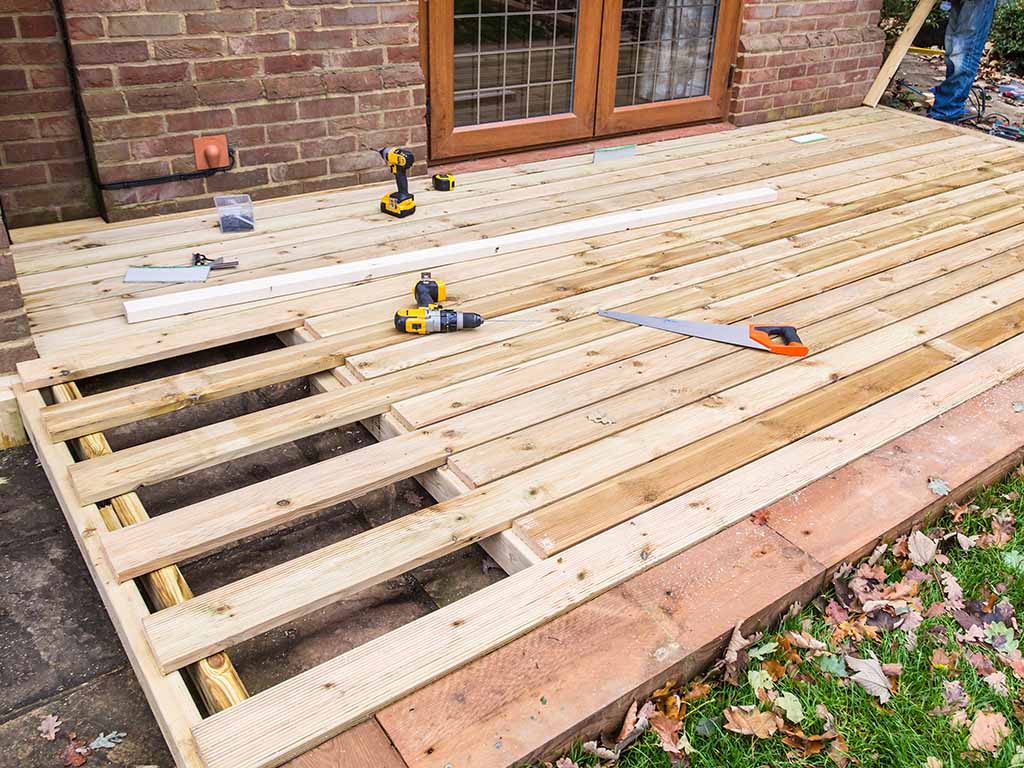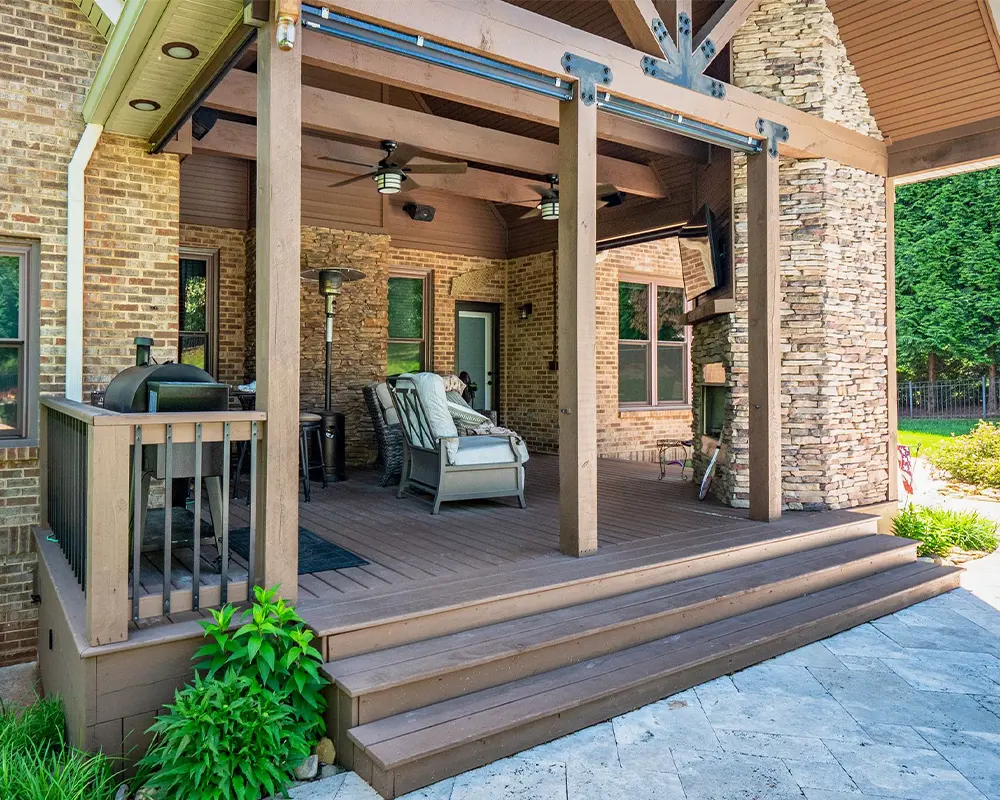Find peace of mind by hiring a experienced deck installer Austin who knows the local building codes.
Find peace of mind by hiring a experienced deck installer Austin who knows the local building codes.
Blog Article
Just how to Choose the Right Products for Your Deck Setup Project
Selecting the appropriate materials for your deck installation job can appear complicated. There are countless elements to think about, from longevity and maintenance to visual appeals and environmental impact. The option in between standard timber and composite materials, each with its own set of advantages and downsides, can be particularly challenging. The key is to balance your spending plan, layout preferences, and lifestyle requires to produce a deck that will certainly improve your outdoor space for years to come.
Recognizing the Different Kinds Of Deck Products
When beginning on a deck installment task, the choice of materials ends up being a critical decision. Numerous choices are available, each with one-of-a-kind attributes and aesthetic allure. Standard wood, as an example, provides an ageless, all-natural look and is usually a lot more affordable. Nonetheless, it can warp gradually and requires regular maintenance. Composite products, on the various other hand, are a mix of wood and plastic, supplying toughness and resistance to weather elements. They require less maintenance compared to timber but are typically a lot more expensive. One more option is vinyl, which is basically maintenance-free and immune to bugs and rot, albeit much less natural-looking. By comprehending these distinctions, homeowners can make an extra informed decision on the most ideal deck material for their particular demands.
Assessing the Toughness and Maintenance Demands of Deck Materials
Analyzing the toughness and upkeep demands of deck materials is a vital action in deck installation. Longevity involves the product's ability to endure extreme climate problems, wear and tear, and its durability.
Comprehending maintenance demands is equally vital. Some products require normal sealing or staining to keep their appearance and stand up to wetness damage, while others, like composite outdoor decking, require less maintenance. By assessing these factors, one can pick one of the most suitable decking material, guaranteeing an equilibrium between sturdiness, upkeep demands, and visual allure.
Expense Analysis: Contrasting Timber and Composite Decking
Although expense may at first appear like a secondary concern, it is a substantial aspect when comparing wood and composite outdoor decking. On the various other hand, composite decking, while pricier at first, calls for much less upkeep, possibly reducing lasting costs. Possible deck proprietors need to consider their budget and readiness to keep their decks when making a decision between timber and composite decking.
Aesthetics and Design Adaptability of Decking Products
Natural wood outdoor decking provides a timeless, timeless appearance, while composite materials use a broad range of shades and structures to suit varied preferences and styles. Composite products, while less adaptable in design, are still adaptable sufficient for many deck styles. These factors, consequently, are crucial determinants in the choice of decking material.
Environmental Effect of Decking Products
When picking outdoor decking products, one must think about not only aesthetics and longevity, but likewise the environmental influence. It is essential to examine the sustainability of materials and check out recycled decking options. Comprehending the potential impact on neighborhood environments will certainly guarantee an extra environmentally accountable selection.
Evaluating Product Sustainability
In the realm of deck building, examining product sustainability is an essential action. Composite decking products frequently incorporate wood and plastic, minimizing the demand for new timber yet enhancing reliance on fossil gas - deck installation near me. Thus, the option of outdoor decking products must stabilize functionality, aesthetics, cost, and sustainability to guarantee a liable and durable installation.
Recycled Decking Options

Composite decking is especially popular due to its longevity and ease of maintenance. Recycled plastic decking, on the various other go now hand, is extremely durable and needs marginal maintenance.

Influence On Local Communities
While the advantages of making use of recycled products for decking can not be overstated, it's similarly essential to take into consideration the more comprehensive environmental ramifications of these options. The removal, handling, and transport of products can profoundly affect local communities. Deforestation for hardwood outdoor decking adds to environment loss and climate adjustment. Also the manufacturing of composite materials can launch harmful emissions. On the other hand, using recycled or sustainably sourced materials can assist reduce these effects. In addition, considering the life expectancy of materials can reduce ecological effect; longer-lasting options need less frequent replacement, therefore conserving sources. Finally, proper disposal of old outdoor decking is essential to lessening landfill waste (deck installation austin). Basically, an eco-conscious deck task demands mindful material selection, sustainable sourcing, and accountable disposal.
Making Your Final Decision: Tips for Picking the very best Deck Materials
As the short article transitions into the subtopic of "Making Your Final Decision: Tips for Picking the most effective Deck Materials", it is important to understand the selection of deck materials readily available. Striking a balance in between toughness and aesthetic appeal is vital in this choice procedure. The adhering to discussion will certainly guide visitors in making an educated selection based upon these essential factors to consider.
Comprehending Various Deck Products
The task of picking the best materials for your deck installation can seem intimidating because of the substantial array of options offered. Comprehending the various products can streamline this procedure. Timber is a popular option, offering a classic visual and affordability. Sorts of wood used include pressure-treated lumber, cedar, and redwood. Compound products, made from a mix of timber and plastic, are low-maintenance and resistant to rot and bugs. Vinyl or PVC decks are also extra durable and require less upkeep than composite products, yet they can look much less all-natural. Last but not least, light weight aluminum decks are solid, lightweight, and immune to rot, but they are also one of the most costly option. Each product has its own advantages and drawbacks, making it critical to consider your certain requirements prior to making a decision.
Resilience vs. Visual Appeals Balance
Stabilizing toughness with aesthetics can be an obstacle when picking deck products. The decision typically comes down to individual choices and the deck's planned use. High-traffic locations might necessitate resilient materials like composite outdoor decking, which endures wear and tear however additional reading might do not have the all-natural charm of timber. On the various other hand, wood provides a timeless appeal and warmth that synthetic materials battle to replicate. It calls for more maintenance and may not last as long. Consequently, homeowners need to strike a balance, considering both the deck's practical needs and their aesthetic preferences. By doing so, click here to find out more they can ensure their deck stays a functional and eye-catching outdoor area for many years to come.
Verdict
To conclude, picking the best products for your deck installation project calls for cautious factor to consider of factors such as durability, maintenance, expense, appearances, and ecological impact. Whether you select conventional wood or composite materials, your option should align with your budget, layout preferences, and way of living. Inevitably, the most effective decking product is one that boosts your outside space and supplies enjoyment for many years to find.
Report this page